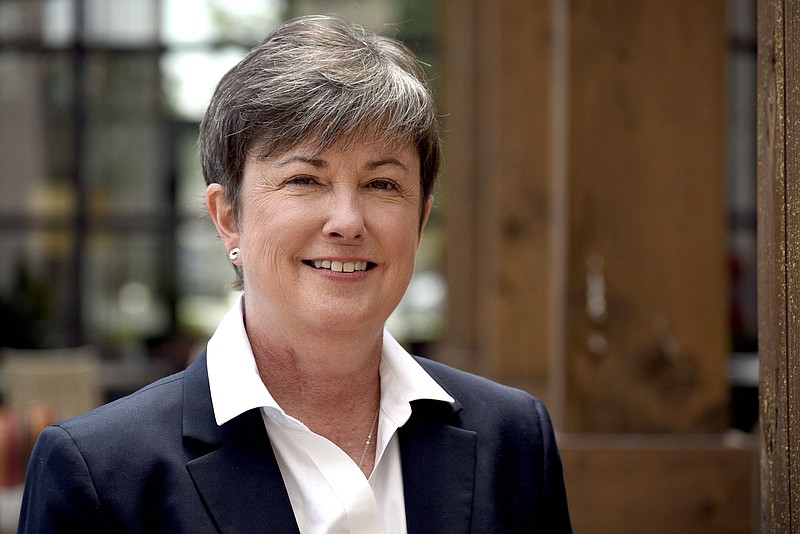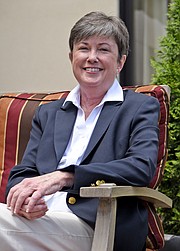Judge Connie Blaylock is retiring Wednesday after 21 years serving as the first full-time juvenile court judge for Georgia's Whitfield and Murray counties.
"It's been very rewarding," Blaylock said. "I feel very blessed to hopefully have been a positive influence and impact on as many lives as I have. I'm not going to miss the stress, but I'll miss the people."
Her successor, local attorney Philip Woodward, will begin immediately, she said.
Although going to law school was a lifelong dream of hers, Blaylock hadn't always been involved in the judicial system.
"I originally got a political science degree to go to law school, and then I got my master's in public administration, but by that time I was burned out with school," Blaylock said.
She worked as a sales representative at Philip Morris for six-and-a-half years before deciding to go back to school to earn her law degree at the University of Georgia. When she was done, she moved to Dalton, where she began practicing law.
After six-and-a-half years of working on real estate, domestic and juvenile court-appointed work, Blaylock was named part-time associate juvenile court judge in July 1996. She became the full-time juvenile court judge in January of the next year, a position that had never been held in Whitfield and Murray counties.
As the juvenile court judge, Blaylock presided over cases involving allegations of delinquency or traffic violations of children under the age of 17 and unruly conduct of those under the age of 18.
"It can be very rewarding, but it can also be very stressful and frustrating," Blaylock said. "Someone you hoped was doing well gets into trouble again, and, you know, that's frustrating. But when people do well, that's rewarding."
Although she said it doesn't happen often, young people have come back to visit her and thank her over the years for helping them as children.
A young man ran into her outside the courthouse a few weeks ago, Blaylock recalled in a news release announcing her retirement.
"He told me he wanted to thank me because I saved his life," she said. "I said, 'I don't know about that, but I'm glad we were able to help.' He said he works for one of the mills here and has kept and maintained a steady job and has not been to prison, so that's a success."
One woman sent her an email letting her know she had recently gotten out of the military, got married, has children, and is getting a college degree.
"You have to take your successes where you can get them," she said in the news release. "Sometimes not going to prison is a success."
Other cases Blaylock has dealt with include those that involve abuse or child neglect. She said about 80 percent of the children who go into foster care are able to go back home once the parents have completed a plan set in place by the court and the Department of Family and Children Services.
"Depending on what caused the children to come into care, the plan is driven by those needs," she said. "If the parents successfully complete that plan, then the court and the department transition the children back home and get out of the people's lives."
But sometimes children are not able to go back home. Some cases, such as those that involve serious mental illnesses, are too dangerous unless there are two parents in the home, Blaylock said. At that point, the children are placed with a relative or, if a relative is not suitable or willing, they are put into foster care.
"Some children thrive in what you or I would consider a better environment," she said. "If the intervention is done early enough, my opinion is that there is less of an impact on the child."
Having terminally ill parents is another instance in which a child could not go back home, Blaylock said.
"In those cases, if we are not able to find a relative, the children can be adopted," she said. "It can be really tragic."
Despite the stressful work as juvenile court judge, Blaylock said she never dreaded waking up in the morning to do the job.
"It's been the most fulfilling thing I've ever done," she said. "It's just what I do. It's been more than a job. It's been a passion. I think if you can say that about what you do all day every day, that's really all you can ask for."
And, although not everyone has been happy with the outcomes of their cases, Chad Gerrells, who has worked with Blaylock for 17 years, 10 of which were spent in her courtroom multiple times a day as an investigator for Child Protective Services, said she was fair in making very difficult decisions.
"It was a testament to her passion to help children," he said. "I wish her well. She's earned it."
Contact Rosana Hughes at rhughes@timesfreepress.com or 423-757-6327.

